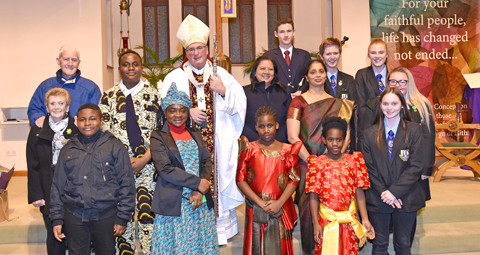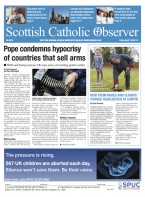April 5 | ![]() 0 COMMENTS
0 COMMENTS ![]() print
print

A hundred Scottish welcomes to Catholics from abroad
Pictured above is a photo of Archbishop Tartaglia of Glasgow with parishioners from Scotland, India, Asia and Africa who made their home in Glasgow’s Immaculate Conception parish
Last weekend, any unexpected visitors to cathedral house would have found things slightly more chaotic than usual: beds and tables were being carried up and down the stairs, the fridge was being stocked with all sorts of very un-Lenten delights and the smell of furniture polish was heavy in the air.
We were getting ready to offer a warm, Scottish welcome to a new priest, travelling from India, who will be living and working in Edinburgh for the next few years.
The latest addition to our clergy team comes from Kerala, where there is a large Catholic population dating back to the time of the Apostles.
Syro-Malabar
The Syro-Malabar Catholics, as they are known, are a branch of the Catholic Church which celebrates Mass and the other Sacraments according to their own distinctive and very ancient rites.
Here in Scotland, there are many flourishing Syro-Malabar communities served by priests from Kerala, many of whom also care for local Roman Rite parishes.
They are not alone. Our Scottish Church is becoming increasingly international, made up of priests and people coming from every corner of the world.
Without the support of visiting priests our dioceses and parishes would surely struggle to survive.
Indeed, as I listen with some trepidation to the debates around Brexit, I bear in mind that of the four priests and two religious Sisters in our parish, I’m the only one with a British passport.
Heritage
Of course, this is nothing new. In modern times at least, the vast majority of Scottish Catholics trace their roots to immigrant communities.
The Irish connection with Scottish Catholicism is well-known, but the Church has historically been enriched by immigration from Italy, Poland and further afield. Many of our churches and schools and halls were built by the hard work, generosity and far-sighted vision of these generations.
But it goes back even further than this, to the very origins of the Church on the day of Pentecost, when the outpouring of the Holy Spirit enabled the Jewish disciples of Jesus to preach the Good News of Jesus to people from all over the ancient world, who each heard the apostles speaking in their own language.
From Jerusalem, these very ordinary men left their homelands and familiar surroundings at the Lord’s command, to travel to the very ends of the earth to bring the whole world into the family of God.
Universal
As Catholics, we ought never to forget that we’re a part of this worldwide family of believers, made up of people of every nation and every culture
This was one of the most important lessons that I learned from my time in training for the priesthood in Rome.
There was perhaps once a time when the Roman seminary system was a means of centralisation, of a narrowing of the mind according to one particular ecclesial culture.
This was not at all my own experience. Rather, Roman life was, for me, the opening up of a treasure house of ‘things both old and new’: an immersion in the rich history and traditions of our ancient Faith, but also the broadening of new geographic horizons beyond the little parish on the East coast of Scotland where I had grown up.
My classmates at the university came from all over the world and offered a wealth of diverse experiences of what it means to be Catholic.
Persecuted
I was particularly moved to sit alongside priests who would return home to be persecuted for their Faith: every year in the seminary we would celebrate the feast of St John Ogilvie, the 16th century Scottish martyr, and then a few weeks later compete in a football tournament named after an Iraqi priest killed for his Faith in just 2007.
We’re so used to doom and gloom statistics about trends in religious practice in the Western world, that it was refreshing to meet people from countries where the Church is thriving.
To my shame, I had no idea that there was a Catholic Church in South Korea: a Korean priest who lived with us in the Scots College told us that the Archdiocese of Seoul boasts almost 900 priests, having ordained 27 new priests last year alone.
There was a day when Scottish and Irish missionaries left these shores in great numbers to spread the Gospel. Some still do, and they deserve our support.
Gratitude
But we should also be very grateful to the many priests from former mission countries who now leave their homes and their families to minister here in Scotland.
They bring so many gifts and talents to our parishes, and they are a reminder that we belong to a Church which extends throughout the world and throughout history.
There are many differences, in language and in culture and in background, but there is much more that unites us: above all, our Faith in Jesus Christ, the King of all the nations.
To our new priests, and to all our parishioners who have come from foreign lands to make Scotland your home: a hundred thousand welcomes! We’re so glad you’re here!










